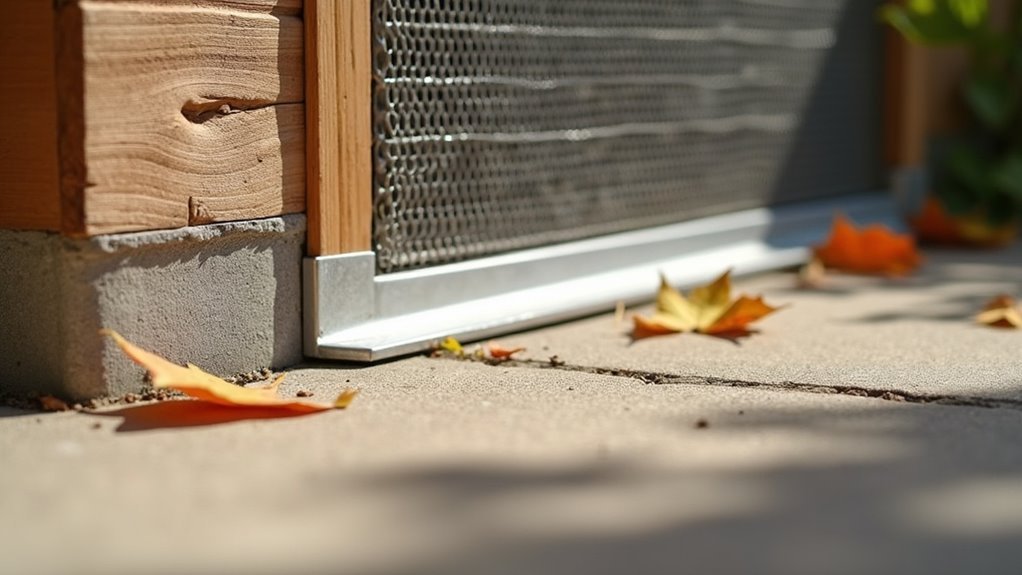You can keep rodents out of your home by sealing entry points larger than ¼-inch with steel wool or caulk, storing all food in airtight metal or glass containers, and maintaining clean kitchen surfaces. Install door sweeps, repair window screens, and trim vegetation away from your foundation. Store firewood at least 18 inches off the ground and 20 feet from your home, while decluttering basements and attics regularly. These thorough strategies will protect your home effectively.
Essential Entry Point Sealing Methods

While rodents may seem harmless, they’ll exploit even the tiniest openings to invade your home. Effective rodent control starts with identifying and sealing these entry points methodically.
Don’t underestimate rodents—they’ll find and exploit every tiny crack and crevice to infiltrate your home’s defenses.
You’ll need to seal any gaps larger than ¼-inch using steel wool or caulk, as mice can squeeze through surprisingly small spaces.
Focus on repairing window screens, door sweeps, and weather stripping around doors. Fill foundation cracks and holes around pipes with concrete or wire mesh for lasting protection.
Don’t forget high-access areas—install chimney caps and screen your vents to prevent roof-level intrusions.
Regular maintenance of garages, crawl spaces, and exterior walls guarantees new openings don’t develop over time, keeping your seal efforts effective year-round.
Food Storage and Kitchen Safety Practices
Once you’ve secured your home’s entry points, your next defense against rodents focuses on eliminating their primary motivation for invasion—food sources.
Your kitchen becomes the battleground where proper storage and cleanliness practices determine success in keeping these unwanted visitors away.
Transform your kitchen into a rodent-proof fortress with these essential practices:
- Store all food items, including pet food sealed in airtight metal or glass containers to deny access
- Clean kitchen surfaces, countertops, and floors regularly to eliminate crumbs and spills
- Dispose of garbage promptly using trash cans with tight-fitting lids
- Keep food items off countertops by storing them in cabinets or pantries
- Inspect and clean behind appliances regularly to remove hidden food debris
These strategies effectively keep rodents from finding reasons to stay.
Exterior Maintenance and Landscaping Tips

After securing indoor food sources, you’ll need to turn your attention to the exterior of your home, where proper landscaping and maintenance create powerful barriers against rodent intrusion.
Trim tree branches and shrubs that hang close to your house, eliminating pathways rodents use to access rooflines and siding. Maintain tidy landscapes by removing weeds, leaf piles, and overgrown vegetation that shelter rodents.
Eliminate rodent highways by cutting back overhanging branches and clearing dense vegetation that provides shelter near your home’s exterior.
Store firewood at least 18 inches off the ground and 20 feet from your home to prevent nesting.
Inspect and seal any gaps around your foundation, windows, and exterior doors to block entry points. Keep shrubs cut back from your foundation to reduce hiding places.
These maintenance practices work together to keep mice away from your property effectively.
Decluttering Strategies for Rodent Prevention
Beyond exterior maintenance, indoor organization plays a significant role in keeping rodents away from your home. Decluttering eliminates potential hiding spots that attract these unwanted pests. When you maintain organized spaces, you’re actively preventing a rodent infestation before it starts.
Focus your decluttering efforts on these key areas:
- Clear basements, attics, and garages of unnecessary items that create rodent shelters
- Dispose of old newspapers, cardboard, and junk that serve as nesting materials
- Keep laundry piles organized and off floors to reduce concealment areas
- Elevate stored items off the ground and organize boxes to prevent nesting
- Routinely check and clean clutter-prone areas for consistent rodent prevention
Regular decluttering makes rodent activity easier to spot while removing the disorganized environments where they thrive.
Natural Deterrents and Household Remedies

While professional pest control remains the most reliable solution, several natural deterrents and household remedies can effectively discourage rodents from entering your home.
Essential oils like peppermint, cayenne, and cloves work exceptionally well since their strong scents repel mice naturally. You can spray apple cider vinegar mixed with water in areas where rodents typically gather—the powerful odor keeps them away.
Instant potatoes serve as an effective home remedy; when mice consume them, the potatoes expand in their stomachs, causing discomfort that deters future visits.
Place fabric softener sheets with strong fragrances near potential entry points to create barriers. Mothballs also emit odors rodents dislike, helping prevent mice and protect your home from unwanted intrusions.
Proper Firewood and Material Storage
You’ll want to store your firewood at least 18 inches off the ground using a proper rack system to prevent rodents from nesting underneath.
Keep all wood piles a minimum of 20 feet away from your home’s foundation, as closer proximity creates an easy pathway for rodents to access your house.
Never stack firewood directly against exterior walls, since this fundamentally provides rodents with a bridge straight to potential entry points.
Elevate Wood Storage
Since rodents naturally seek warm, sheltered spaces for nesting, your firewood storage practices can make or break your pest prevention efforts.
Elevating your wood storage is critical for protecting homes from unwanted invaders. When you store firewood at least 18 inches off the ground, you’ll prevent rodents from establishing nesting sites while reducing moisture that attracts pests.
Keep wood stacks at least 20 feet away from your house to minimize entry opportunities.
- Use proper firewood racks for organization and elevation
- Store wood 18+ inches off ground level consistently
- Maintain 20+ feet distance from exterior walls
- Inspect regularly for droppings and gnaw marks
- Never place firewood directly against building structures
Distance From Foundation
Beyond proper elevation, maintaining adequate distance from foundation creates an essential buffer zone that disrupts rodent travel patterns.
You’ll want to keep firewood at least 20 feet away from your house to minimize the chance of rodents using it as a pathway for entering your home. This distance prevents mice and rats from easily moving from your wood pile directly to your foundation, where they’ll search for entry points like cracks or gaps.
The greater the distance from foundation, the less likely rodents will establish travel routes between storage areas and your home.
When rodents can’t create direct pathways, they’re forced to cross open ground where they’re more vulnerable to predators, naturally discouraging them from attempting entry.
Door and Window Protection Techniques
Your doors and windows create the most vulnerable entry points for rodents seeking shelter in your home.
You’ll need to install door sweeps on exterior doors, repair any damaged window screens, and seal gaps around window frames with caulk or steel wool.
These targeted measures will block the small openings that rodents exploit to gain access to your living space.
Install Door Sweeps
One of the most effective ways to block rodent entry points is installing door sweeps on all exterior doors. These barriers seal gaps at the bottom of doors, preventing rodents from squeezing through openings larger than a quarter-inch.
Door sweeps also improve energy efficiency by maintaining indoor temperatures while blocking unwanted pests.
Choose durable materials like rubber or vinyl that’ll withstand daily wear and provide long-lasting protection. Remember to inspect your door sweeps regularly and replace any worn or damaged ones to maintain their effectiveness.
- Measure gaps under exterior doors before purchasing door sweeps
- Select rubber or vinyl materials for maximum durability
- Install sweeps flush against the floor to eliminate entry points
- Check door sweeps monthly for wear, tears, or displacement
- Combine with sealed containers for food storage and thorough rodent prevention
Repair Damaged Screens
While door sweeps secure the bottom of your entries, damaged screens on doors and windows create equally vulnerable access points that rodents exploit. You must repair damaged screens immediately, as even tiny tears allow mice to squeeze through. Use fine mesh material with 1/16-inch openings to block the smallest rodents effectively.
Inspect all screens regularly for holes, tears, or loose fittings. Small gaps around screen frames provide easy rodent access, so guarantee tight installation without compromises. Replace worn screens when repairs won’t restore their integrity.
Consider magnetic screen panels or screen doors that automatically close, preventing accidental openings. Check frame seals and hardware periodically, as deterioration weakens your barrier.
Properly maintained screens form a vital defense layer in your extensive rodent prevention strategy.
Seal Window Gaps
Although window screens provide your first line of defense, gaps around window frames create the most overlooked entry points for determined rodents.
You’ll need to seal window gaps thoroughly since mice can squeeze through openings as small as ¼-inch. These tiny invaders constantly search for ways to enter homes, especially during colder months when they’re seeking warm shelter.
Focus your sealing efforts on these critical areas:
- Window frame perimeters – Apply weatherstripping or caulk around all frame edges
- Sash connections – Check where moving window parts meet stationary frames
- Corner joints – Inspect frame corners where materials often separate over time
- Sill gaps – Seal spaces between window sills and exterior walls
- Hardware mounting points – Fill holes around locks, handles, and hinges
Regular Inspection and Maintenance Schedules
Establishing a consistent inspection routine forms the foundation of effective rodent prevention, as small problems can quickly escalate into major infestations when left unchecked.
Regular inspections prevent small rodent problems from becoming costly, overwhelming infestations that threaten your home’s safety and comfort.
You’ll want to conduct regular inspections of your home, searching for cracks, holes, or gaps larger than ¼-inch that serve as entry points for rodents. Create a maintenance schedule every season to check window screens, door sweeps, and weather stripping for tears or gaps.
Don’t forget storage areas like attics, basements, and garages—inspect these spaces for droppings or gnaw marks to catch problems early.
Outside, trim vegetation and remove debris that could shelter rodents. Keep a detailed log of all inspections and maintenance work to track changes and guarantee you’re consistently applying preventive measures throughout your home.
Frequently Asked Questions
What Is the Best Way to Keep Rodents Out of Your House?
You’ll prevent rodent infestations by sealing quarter-inch openings, storing food in airtight containers, maintaining cleanliness, trimming vegetation near your house, and installing door sweeps while repairing damaged screens.
What Do Rodents Hate Most?
Rodents hate strong scents that disrupt their navigation. You’ll find peppermint oil, ammonia, and citrus scents most effective. They also can’t stand cayenne pepper, cinnamon, and eucalyptus essential oils.
What Scent Drives Rodents Away?
You’ll find ammonia works exceptionally well since it mimics predator urine. Peppermint oil, citrus scents, and vinegar also repel rodents effectively. Strong-scented dryer sheets provide temporary relief, while cinnamon and cayenne pepper offer natural alternatives.
What Is the Most Effective Rodent Repellent?
You’ll find peppermint essential oil most effective for repelling rodents. It disrupts their natural senses and deters entry. Apply it around entry points, refresh regularly, and combine with other deterrents like cayenne for better results.
In Summary
You’ll keep rodents out by sealing entry points, storing food properly, and maintaining your property’s exterior. Don’t forget to declutter regularly, use natural deterrents, and store firewood away from your home. Protect doors and windows with proper screening and weatherstripping. Most importantly, you’ll need to inspect your home regularly and stay consistent with these prevention methods. Taking these proactive steps will create an unwelcoming environment that rodents won’t want to invade.





Leave a Reply